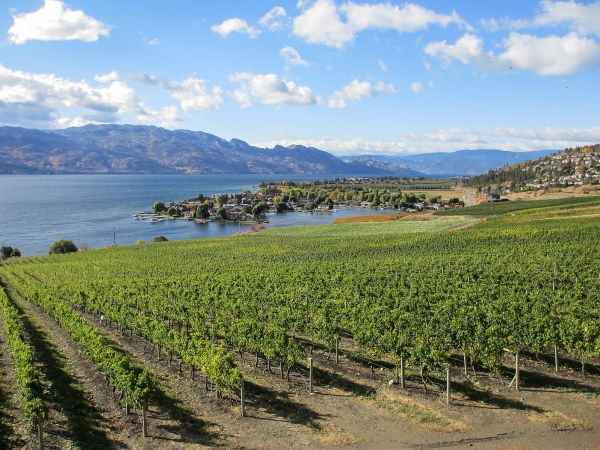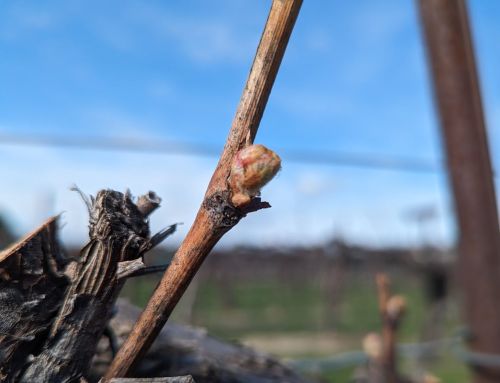
Kelowna area vineyards by Mack Male
On Thursday, Washington Winegrowers, a non-profit trade association, published guidance for exporting grapes from Washington and importing such grapes into British Columbia (BC). The guidance comes after BC experienced a devastating freeze in January that is expected to result in 97-99% crop loss.
“Our wine growers currently have grape supply, and BC has a demand because of the recent freeze, so we’re trying to do some matchmaking which might benefit everyone,” said Colleen Frei, executive director of Washington Winegrowers.
The publication contains details on regulatory requirements for exporting whole wine grapes, crushed grapes, and pressed wine grapes into Canada. It also includes a checklist for US, Washington, and Canadian requirements as well as a resource list.
“BC wineries are going to need wine grapes from somewhere,” said Frei, who became executive director January 1st. “To get them from somewhere that’s the closest seems to be ideal, certainly from a global environmental footprint.”
The document has been coordinated by a host of Washington and US government agencies. This includes the Washington State Department of Agriculture, United States Department of Agriculture, Animal and Plant Health Inspection Service, Agricultural Marketing Service, and others. The Washington State Wine Commission, the state agency charged with promoting Washington wine, has also been involved. (Full disclosure: I have consulted for the Wine Commission since 2013.)
“What I want to convey is that we’re here willing to help,” said Kristina Kelley, executive director of the Washington State Wine Commission.
On paper, there are clear synergies between Washington and British Columbia. Washington has an excess of grape vines planted. This is in large part due to Ste. Michelle Wine Estates, the largest winery in the Pacific Northwest, telling its Washington growers last summer that the company was decreasing its fruit input by 40%. As a result, tens of thousands of tons of grapes went unpicked in 2023. In contrast, British Columbia has a grape need.
The two areas also share a border and are similar in their northern latitude. British Columbia’s most planted varieties include Merlot, Pinot Noir, Pinot Gris, Chardonnay, Cabernet Sauvignon, Cabernet Franc, Riesling, Gewürztraminer, Syrah, and Sauvignon Blanc. All of those varieties have abundant plantings in Washington.
While Oregon does not currently have the same overabundance of grapes that Washington does, there are similar synergies. Willamette Valley has extensive plantings of Pinot Noir, Chardonnay, and Pinot Gris.
There are, of course, a number of potential complications. Washington also experienced extreme cold temperatures in January. The full extent of damage is not currently known. Some areas, however, appear to have been hard hit.
That is likely to impact how many tons of grapes are available. Some varieties are also likely to be more impacted than others. This might affect availability for Washington growers and potentially BC wineries interested in sourcing grapes.
Additionally, much of the acreage that Ste. Michelle dropped, which is a large part of what is available, was farmed for high tonnage production. These vines cannot necessarily be immediately converted over to farm for high quality.
British Columbia regulatory requirements are also at issue. Among them, land-based wineries – wineries that grow some of their own fruit – must make a certain percentage of wine from those plantings. Using grapes from an area outside British Columbia would require waiving those regulations.
“What we’re asking for is special dispensation to be able to bring in fruit from, it could be Ontario, it could be Washington, it could be Oregon,” David Paterson, general manager and winemaker at Tantalus Vineyards in Kelowna, told Northwest Wine Report earlier this month.
There are other considerations for British Columbia, such as how the wines might be labeled and to whom they might, or might not, be sold to. “It all has to be 100% transparent,” said Nikki Callaway, winemaker at O’Rourke Family Estate in Lake Country. “We probably can’t export the wines. It probably can’t be sold elsewhere.”
Some BC wineries are interested in importing grapes from Ontario. Others are less enthusiastic about the possibility.
“I will not buy grapes in Ontario,” says Callaway. “I don’t see the benefit of traveling four days across the country just because they’re Canadian grapes.” She also noted that Washington and Oregon share similar terroir to the Okanagan Valley.
Overall, Washington Winegrowers formalizing guidance is an important step. However, there is still much to be sorted out. There is also a great deal at stake.
The potential total crop loss in BC this year comes on the heels of a severe crop loss in some areas last year. This could represent an existential crisis for some wineries.
“Wine is the number one draw to tourism,” Paterson noted. “A total failure of this industry would mean a huge downturn in the economy of Okanagan.”
Such a failure would not impact just wineries. It would impact hotels, restaurants, shipping companies, electricians, plumbers, and other businesses that service wineries. Ultimately, urgency is required on all sides. Assistance too late might have the same consequences as no assistance at all.
“Time is of the essence here,” Paterson said. “If I’m going to make an Oregon wine, I need to go and start doing those deals.”
Callaway agrees. “I will need to be getting down to Washington immediately. I’ll need to be looking at the vines, setting up contracts, figuring out viticulture, logistics. We could have grapes here in August.”
Northwest Wine Report is wholly subscriber funded. Please subscribe to support continued independent content and reviews on this site. It is the only way that the site will be able to continue.
To receive articles via email, click here.







“Additionally, much of the acreage that Ste. Michelle dropped, which is a large part of what is available, was farmed for high tonnage production. These vines cannot necessarily be immediately converted over to farm for high quality.”
This statement you made is not true. Many of these vineyards were high quality and can be managed for high quality quite easily
Dick, good to know. I’ve heard otherwise from some wineries.